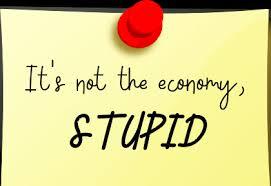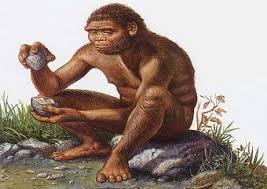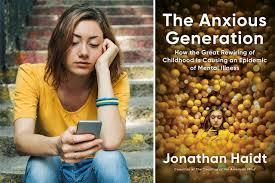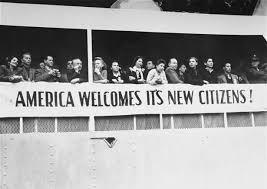“It’s the economy stupid,” decreed James Carville, Bill Clinton’s 1990s campaign guru — a line that became a staple of our politics, saying it’s the economy that really decides elections.

If so, Joe Biden would be winning easily. Okay, inflation’s still bothersome. But economic growth is strong, lifting many boats, wages are rising, unemployment is at record lows, and stocks are up.
But today, it’s the culture stupid. More specifically, cultural flux. That’s the only way to make sense (if you call it sense) of an election that’s close between a normal decent president with a decent record and one of the vilest human beings ever to disgrace the species.

That species has existed over 100,000 years. So civilization, only around 10,000 years old, is still a relatively new thing, requiring some getting used to, tweaking our ancestral mindsets and psychologies. But at least for nearly all that latter time, there’d be hardly any change during one person’s life.
That’s no longer true. People around when the Wright Brothers flew lived to see men land on the Moon. And in just the last few decades, our world has been quite thoroughly remade. Computers and the internet only took off in the ’90s. Smartphones began in 2007. Then came social media. Younger people today, grown up with all that, seem like a different species.
But it’s not just technology. A whole other realm of change is cultural. Old verities concerning race, gender, sexuality, have been thoroughly discombobulated. Bigger still, the role of women has been revolutionized. It’s only a few decades since The Feminine Mystique was published. In that short period, male-female relations, family life, and work life have undergone dramatic change.
In general, this is all progress, giving ever more people greater opportunities to lead rewarding lives. Yet it’s messing mightily with the mentalities bred into us by all those millennia of evolution. In so many ways, we weren’t built for the world we’ve got today, and we’re scrambling to adjust.

NYU psychologist Jonathan Haidt’s recent book, The Anxious Generation, looks into an explosion of depression and other psychological ills afflicting younger Americans. Social media, he thinks, and changing styles of parenting, play a big role. Here too it’s people struggling to adjust our ancient ways of being to new and different ones.
Not much here is directly political. Nevertheless, in a world that to many people seems confusing, out of control, even leaving them behind, politics does offer one way at least to assert themselves. To exert some control and fight their felt disempowerment. Giving expression to their bubbling resentment at the cultural upheaval mucking up their comfort in their skins.

This is the deep story behind all the right-wing nationalist populist politics we’re seeing in most of the “advanced” world. Take immigration. Seen by many as affronting their idea of “the way things should be.” That is, the way they used to be, with ethnically homogeneous communities. Immigration in America in fact hasn’t really expanded, but what’s different is that today newcomers are more spread out rather than concentrated in a few big cities. The cultural change associated with immigrants fuels right-wing populism everywhere.
Thus we see Britain’s government heedlessly pushing an idiotic, inhumane (and costly) scheme to ship asylum seekers to Rwanda. While notably, the one rich nation with no such nationalist populist movement is Japan — which has almost no immigrants.
Elsewhere it seems the world is going haywire. People losing their grip. And the perverse thing about it is that this political response, far from achieving what populists imagine, actually threatens to make things much much worse for them. Take immigration again. To actually shut our borders and bar newcomers would be national suicide. In fact a key reason why America’s economy is actually doing so well compared to other leading nations is that we have more immigrants, replenishing our work force as the native population ages and pensioners proliferate.

The Economist recently examined the sad decline of many American small towns with population shrinkage in death spirals. More immigration would help. Trump’s promise to deport millions would be economically catastrophic for U.S. businesses benefiting from their labor. Trade war is also ruinous for the economy. All in all, populist medicine is poison.
And if you hate how ugly politics has become, electing Trump would hardly be the cure. It could happen because many people are indeed turned off by the ugliness he’s unleashed, so they won’t vote. David Brooks in a recent column noted that young people (18 to 34) in particular are disaffected, with only 36% saying they’re greatly interested in this election. Astonishing given the stakes.
I consider myself a humanist. The essence of humanism is understanding that our fates are in our own hands. The vast changes to our world give us vast opportunities. We mustn’t screw it up.
